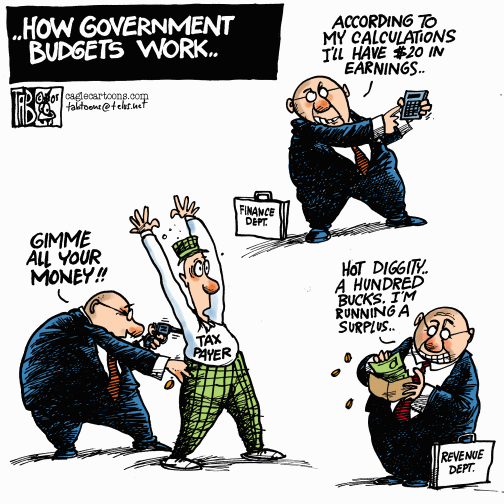 By JOHN M. CRISP Scripps Howard News Service September 11, 2007
But a little ignorance might be useful if it generates a natural suspicion of otherwise counterintuitive economic notions. For example, if a big economic entity, like a government, is running a deficit, can you really improve things by cutting its income, that is, by reducing taxes for the wealthy in order to encourage investment and, therefore, more tax revenue? Plenty of intelligent economists disagree about whether this really works. But since this approach to handling money is dubious in most other contexts, people like me can't help but wonder if supply-side economics isn't just another way to make it easier for the rich and powerful, who implemented the idea to begin with, to increase what they already have.  Artist Tab, The Calgary Sun Distributed to subscribers for publication by Cagle Cartoons Inc. Or consider globalization, another initiative of the rich and powerful. On its face, it's the sort of idea that could appeal to liberals and conservatives alike. Allowing goods and capital to move freely across borders will nourish a strong economic tide that lifts all boats on both sides of our borders. In fact, in the July/August issue of Foreign Affairs, Kenneth Scheve (a political scientist at Yale) and Matthew Slaughter (an economist at Dartmouth) argue that the move toward globalization has produced, by some estimates, additional income in the United States of somewhere between $500 billion and $1 trillion. Yet Scheve and Slaughter warn of an increasing inclination among Americans toward protectionism, a desire to re-erect some of the former barriers to trade. Why? They're not entirely sure, but they suspect that it has to do with the fact that very, very few Americans have actually benefited from the income growth resulting from globalization. In fact, according to Scheve and Slaughter, the only citizens who have experienced any growth in real money earnings between 2000 and 2005 are those who have Ph.D.s, M.B.A.s, J.D.s, or M.D.s, that is, about 3.4 percent of the population; the rest of us, including college graduates and those with nonprofessional master's degrees, have suffered decreases in our earnings. So, the rising tide is lifting the luxury yachts, but the rowboats, day sailers and canoes are gradually sinking. Scheve and Slaughter are uncertain about the connection between globalization and Americans' falling incomes, but they believe that the impulse toward protectionism should be thwarted, and their solution is more progressive tax rates to redistribute the benefits of globalization to the rest of us. But wait a minute. That seems to undermine one of the basic principles of supply-side economics. And it also undercuts another puzzling economic principle that we generally embrace, the power of the more or less unfettered free market. Some colors on the political spectrum would prefer to give the market its head completely, allowing wages and prices to find their own natural level, even to the point of eliminating the minimum wage. But proponents of a mostly free market have been selective about which markets require regulation. For example, a theme that emerges from Daniel Yergin's "The Prize," his massive history of the petroleum industry, is the surprising extent to which that market has been carefully controlled by the government and other entities, usually for good reasons, based on the idea that oil is essentially different from other commodities. On the other hand, health care is different in extraordinary ways from other commodities, as well, but we insist on submitting our well-being to market forces that are always unthinking and sometimes cruel. Education is different from other commodities, as well, but here in Texas our legislature recently deregulated tuition at public institutions of higher learning in order to allow the market to find its proper level. Tuition skyrocketed, of course, making higher education a much more elusive goal for all but the richest students. Ironically, more education is one of the long-term solutions that Scheve and Slaughter prescribe to resolve some of the significant income inequities that have developed in our country since globalization began in earnest. No wonder I have such a hard time understanding economics.
E-mail jcrisp(at)delmar.edu Distributed to subscribers for publication by Scripps Howard News Service, http://www.scrippsnews.com
|